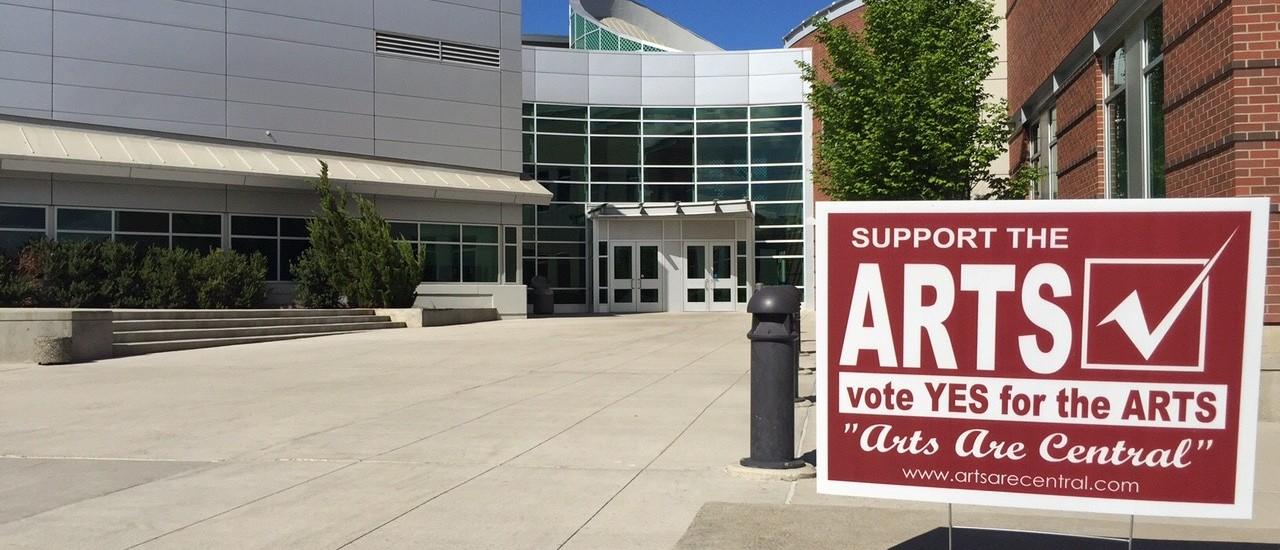Voting now underway on heavily disputed Arts Fee
After months of back and forth between Student Government and the Arts departments, a controversial arts fee will now be voted on by the general student body.
May 5, 2015
Starting Monday, Central’s student body will vote on the implementation of a new $50 per quarter fee supporting the arts programs. If the fee is passed, it will generate approximately $1,125,000 annually for the Student Arts Fund. The fund was created with the vision of enhancing arts and culture for both Central students and the local community.
The proposal, which has received widespread support from students within the College of Arts and Humanities, has been questioned by those outside of it.
Even though the proposed fee would generate money for the aptly titled Student Arts Fund, junior music education major Brian Lawrence ensures that benefits won’t be limited solely to arts students.
“The fund will serve every single student at Central.” Lawrence said. “The arts are one of the pillars of student life. If you improve the arts, you improve the entire campus.”
However, Associated Students of CWU (ASCWU) Student Government has publicly opposed the fee, citing concerns with the proposal’s logistics and methodology.
A Student Arts Fund
While the $50 arts fee has officially been placed on the spring ballot by means of a student petition, the Student Arts Fund proposal – the document addressing exactly how the money will be spent – is still just a draft.
“Right now, we’ve got a draft because we’re still waiting for people on campus to give us feedback on what they’d like changed.” Scott Robinson, chair of the theatre department, said. “Unfortunately, we’ve got a lot of people who don’t like it but don’t want to say what they’d like changed.”
Nick Shuey, executive vice president of ASCWU, believes a vote should be put off until a more polished proposal is presented to the student body.
“If this passes, students are going to be charged $50 a quarter on a fee that has no approved plan regarding how to spend it,” Shuey said.
In the current Arts Fund proposal, money would be distributed as follows: 60% going towards the five represented arts programs: dance, film and video studies, art, music, and theatre arts; 35% going towards the creation of a Speaker and Performance series; and 5% going towards a reserve fund that will be saved for emergencies.
Benefits for everybody
The arts fee would operate in a similar fashion to the already existent athletic fee.
While the vast majority of students at Central don’t participate in a sport, all students are still assessed a $56 athletic fee every quarter. In return for their investment, students are given access to services like intramural sports while being provided free admittance to all sporting events on campus.
Lawrence says that the arts fee will provide similar opportunities for students who wish to take advantage of them, such as free tickets to all concerts, performances, and theatre productions happening at Central.
“I don’t go to the Recreation Center but I have plenty of friends who do.” Lawrence said. “Approving the fee would show a commitment from other students, that they’re willing to invest in their peers.”
In addition to enhancing programs put on by the five departments represented within the proposal, the Student Arts Fund will also create a Speaker and Performance Series that would bring distinguished professionals from various academic fields to Central.
Up until 2012, Central offered the Presidential Speakers Series, inviting high-profile guests like Ken Burns to come and give keynote presentations to large audiences on campus. Now that the program has been discontinued, proponents of the arts fund see an opportunity to bring something similar back to the Ellensburg community.
“The goal of the Speakers Series is to bring in international scholars and speakers from all disciplines to do master classes, seminars, and workshops.” Lawrence said. “Not just famous artists.”
In the proposal’s most recent draft, $225,000 of the $393,750 allocated to the Speaker and Performance Series would be set aside for salaried management positions. One professional employee would be hired to cover marketing and advertising for speakers, while another would be hired to handle contracts.
Robinson said that the management office would also hire a handful of student employees, upon need, to work directly underneath the two professionals, creating unique job opportunities on campus.
“We’ve got kids in the arts who want to make careers in PR and advertising and management, so we want to give students an opportunity in an office that’s doing that.” Robinson said.
Ryan Anderson, Junior musical theatre and political science major, has been the leading student advocate in support of the Arts Fund. Anderson feels that the arts have taken a back seat at Central, ultimately creating a campus that lacks a sense of culture and identity.
“People don’t say, ‘I go to Central Washington University.’ It doesn’t have a name for itself,” Anderson said. “This [arts fund] would create a name and an identity for Central.”
Anderson feels that students from all disciplines have something to gain from an improved arts program.
“Having more funding would bring a higher quality of education to Central, because arts play such a crucial role in a well-rounded education.” Anderson said.
Another benefit of the arts fee would be the return of S&A funding. Currently, The Services and Activities Committee allocates $154,000 per year to the arts. If the proposed fee is passed, that $154,000 would be drawn directly from the Student Arts Fund, freeing up money for S&A to re-allocate throughout other programs.
Inherent problems with the proposal
On April 13th, 2015, ASCWU voted in opposition of the arts fund.
According to Phil Rush, vice president for clubs and organizations, inadequate representation of the student body was the most prominent of their various concerns.
Even though the arts fund is intended to benefit everybody, Rush believes that the breakdown of how money will be spent paints a drastically different picture.
Under the proposal’s most recent draft, 60% of the funds generated – about $525,000 – would be going directly to the five arts programs represented in the proposal. Other than free admittance to performances, ASCWU doesn’t see how increased funding within these academic departments can possibly benefit non-arts students.
“There are 10,000 students at Central who aren’t seeing the same level of benefits as the 720 who are enrolled within the College of Arts and Humanities.” Rush said.
He was also hesitant to compare the arts fee and athletics fee side by side.
“The two fees aren’t synonymous.” Rush said. “The athletic department isn’t an academic department. This [arts fee] is going towards replacing stage curtains and other academic costs within an academic department.”
Yosef Gamble, president of ASCWU, expressed concerns about the large portion of money that would be going towards management positions for the Speakers Series.
“If they want to bring more high-profile speakers to campus, why don’t they collaborate with the Campus Activities office?” Gamble said. “Resources like advertising and marketing already exist at Central through the Publicity Center.”
Still, Anderson stressed the importance of having a separate department to service the needs of the potential Speakers and Performance Series.
“The publicity center gets so overwhelmed with all of the events that happen on campus that usually our events don’t get the attention they need to get advertised. Anderson said. “The specific arts advertising is much different than other events that happen on campus.”
Controversy on campus
Student reactions to the proposed arts fee have varied.
Dylan Call, Sophomore Public Relations major said that he has no idea what the fee is even about.
Courtney Klutz, Freshman, undeclared, noted that she would probably vote against the proposal since it doesn’t affect her. In reference to the amount of the fee, she also said “I feel like it should be less than that.”
On the other hand, some students feel that $50 isn’t even worth the debate when taken into account how expensive college already is.
“I honestly don’t care,” Sarah Gardner, junior bilingual education major said. “What’s $50 in the grand scheme?”
Even though the fee has caused some divide on campus recently, Anderson says he is glad it has gotten people talking about the arts.
“It’s blown up in the best possible way.” Anderson said. “I still think it’s terrible that so much negativity has come out of it when all we wanted to do was have a discussion.”
Anderson says that even if the proposal is denied this year, he will remain adamant in his pursuit to improve campus life for his fellow students.
“If it gets voted down, great. Students are engaged and we have that feedback and we can go rework the numbers.” Anderson said. “I’m just trying to make my campus a better place. Someday, I hope that the school I come from will have an identity that’s different than how I left it.”
Students can vote at polling sites located on the East and West SURC patio entrances Thursday from 10 a.m. to 7 p.m.
Online voting, which is open now, will close at 7 p.m. on Thursday.
A full draft of the proposal can be found here.

